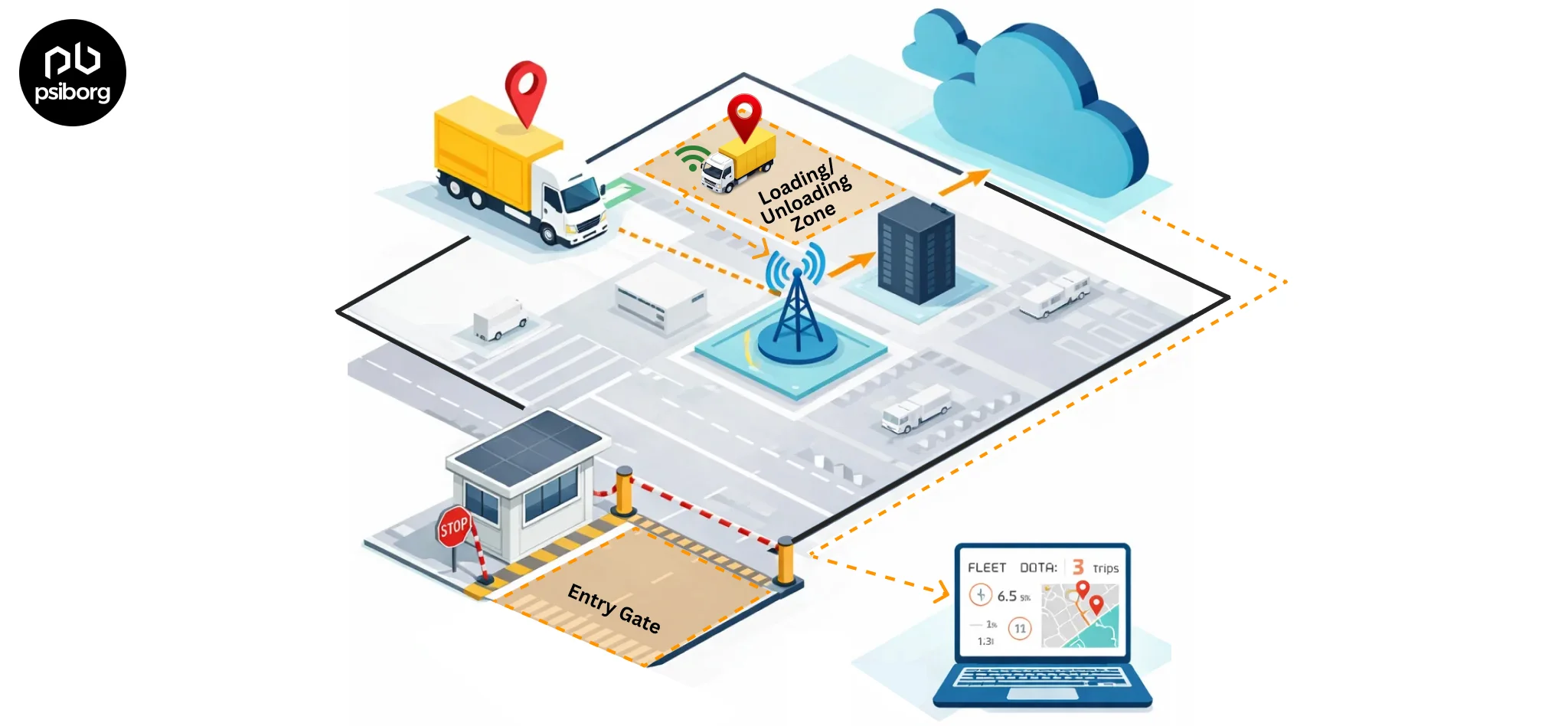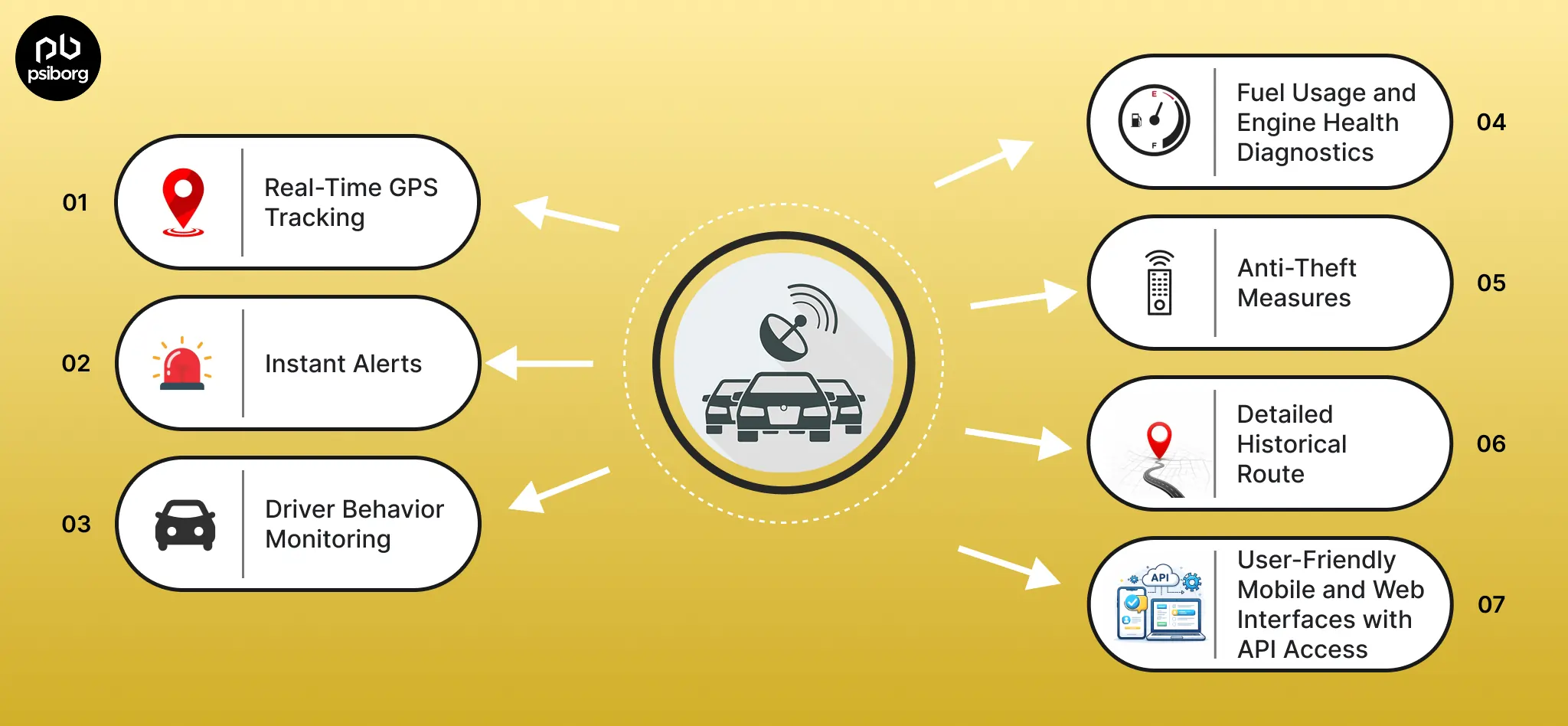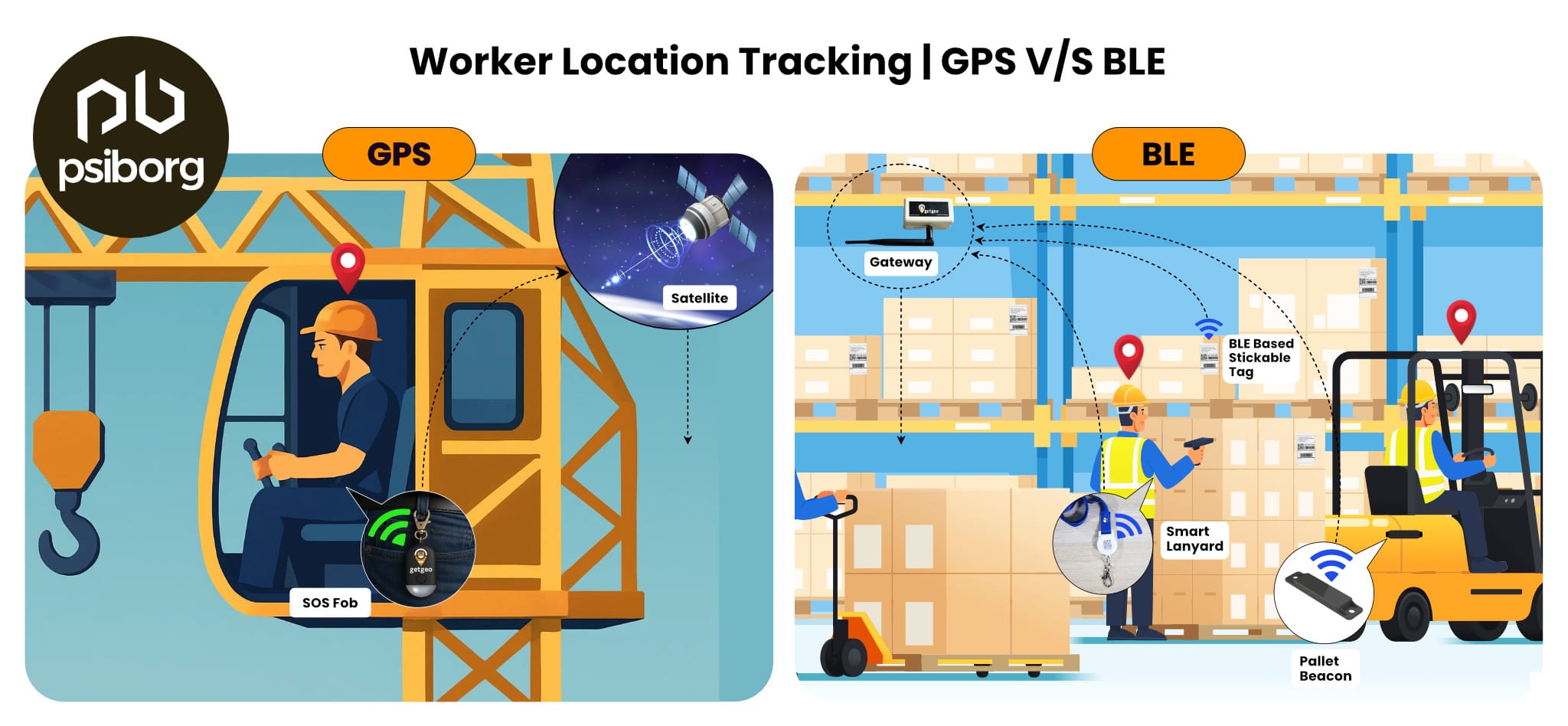The construction industry has never been very high-tech, but things are changing with the changing times and evolving IoT and AI space. IoT in construction industry is fairly new but offers promising use cases.
There are many challenges in the construction industry, such as workers’ safety, machine failure, and unexpected cost overruns. The best way to avoid these challenges and improve operations is to incorporate IoT solutions in construction.
In this article, we will discuss everything about IoT in the construction industry, so let’s get started.
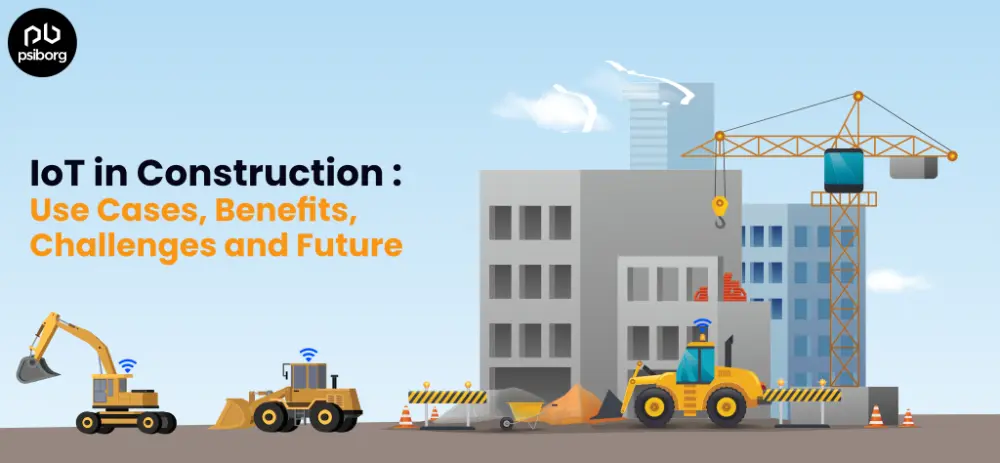
What’s the Role of IoT in Construction Industry?
IoT is changing the way we interact with physical devices in different areas, be it construction or manufacturing industry.
Imagine a large-scale construction project of a new skyscraper. The construction company chose to implement IoT technology across the site. IoT sensors were deployed for heavy machinery like bulldozers and cranes to monitor real-time accurate data on equipment health, usage patterns, location, and fuel consumption.
The deployed IoT sensors monitor the fuel usage in heavy vehicles, giving the company insights into wasteful practices and optimizing fuel consumption. Also, with IoT-based smart wearables, the site manager can monitor workforce distribution, ensuring that the right number of workers are in each zone.
This is an example of a construction site integrated with IoT technology to improve efficiency, safety, and cost management.
All these above-discussed scenarios were once a vision and have now become a reality. IoT is reshaping the construction landscape by setting up new standards in industrial operations like asset management, real-time tracking and monitoring, labour tracking, and fleet management.
IoT in Construction Industry: Market Trends
The market for Internet of Things (IoT) in construction is expected to grow from $11.2 billion in 2021 to $44.2 billion by 2031, with a compound annual growth rate (CAGR) of 14.6%. This means that the market is growing at a faster pace than the overall construction market.
As of 2023, about 30% of construction firms have implemented IoT solutions, with expectations for this number to rise to over 60% by 2025.
Do you know, cities like Singapore and Barcelona have already adopted IoT to develop smart infrastructures and construction companies are providing IoT based solutions to optimise construction site operations, like labour tracking and real-time project status monitoring.
In addition, the release of 5G network has accelerated the adoption of IoT in construction.
Challenges Faced by Construction Industry
IoT technology is transforming various industries, construction being one of them. The construction and manufacturing industry faces several challenges and IoT is the solution to these challenges, for instance:
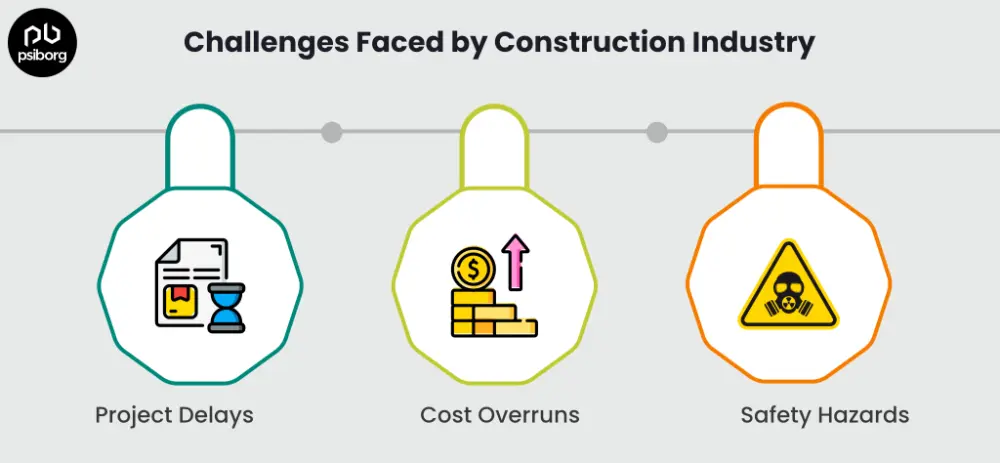
Project Delays
The construction companies face project delays several times, due to unforeseen circumstances and improper project management.
But with real time monitoring, project progress can be tracked that helps in identifying potential delays and so no more project halts and delays.
Cost Overruns
Improper resource allocation, unexpected costs, and sudden changes in the project scope leads to cost overruns.
However, smart IoT solutions can track equipment usage and material consumption that improves resource allocation and reduces waste.
Safety Hazards
All the construction sites are inherently prone to dangers and risks such as falls, equipment accidents, and exposure to hazardous materials.
Using IoT based wearable devices help monitor workers health parameters, location, and detect hazards to trigger alerts.
The environmental sensors monitor air quality, noise level, temperature, and other environmental factors to create a safe working environment.
How IoT is being utilized in the construction industry?
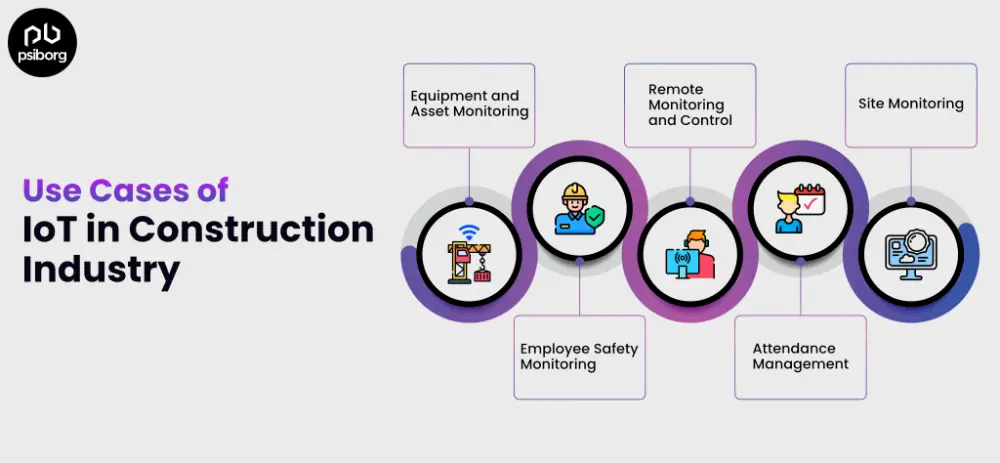
IoT is utilized in construction industry in many ways, from wearable watches and helmets for worker safety to sensors for heavy machinery.
Construction companies have started believing in the potential of IoT and are exploring various ways to integrate it. If you have a construction business and want to incorporate IoT in your construction operations, then here are some of the applications of IoT in construction industry.
Equipment and Asset Monitoring
IoT sensors are installed on heavy machinery and equipment to monitor and analyze their usage, location, and performance in real-time. This helps in tracking equipment health, predicting maintenance needs, and preventing unexpected breakdowns, which reduces downtime and maintenance costs.
For instance-
A construction company uses GPS-enabled sensors to track the location of cranes and excavators, thus improving their usage across multiple sites.
Employee Safety Monitoring
Smart wearables and helmets monitor workers’ location and their health conditions and detect hazardous environments (e.g., toxic gases, high temperatures, or falls). They can send real-time alerts to supervisors, enhancing worker safety.
For example- Smart helmets detect when a worker falls and immediately alert the safety manager, allowing for quick response and potential injury mitigation.
Remote Monitoring and Control
Remote monitoring and control help in comprehensive site monitoring in construction, and it involves overseeing various aspects of a construction site, such as worker activities, equipment usage, material handling, safety compliance, and project progress. IoT helps in providing real-time data and insights, allowing project managers to monitor these parameters remotely and effectively.
Attendance Management
An IoT based attendance system utilizes ble tags, Bluetooth beacons, and GPS-enabled devices to track workers’ presence automatically. This way, accurate attendance record keeping is achieved with limited manual entry. Moreover, real-time attendance data also assists site managers improve workflow allocation, making sure the right number of workers are present at the job site.
Site Monitoring
Construction site monitoring is an important component of the use of IoT in construction industry. The solution uses environmental sensors to continuously record working site conditions. This includes temperature, humidity, noise, and vibration monitoring to ensure safety and compliance at the job site. Structural health monitoring is also done through IoT solutions, allowing construction managers to remotely examine the condition of materials and structures to detect repair requirements.
What are the Benefits of IoT in Construction Industry?
IoT can be a game changer in the construction industry, as it offers several benefits to simplify complex construction operations and improve job site safety. Some of the benefits of IoT in the construction industry are:
Real-time monitoring
IoT solutions let construction site managers monitor and visualize every aspect of the project site remotely. Using sensors, the managers can track equipment usage and worker’s performance in actual time. This improves the overall visibility across multiple locations and allows for quick response to issues. Thus, leading to better project management.
Better resource allocation
With the use of IoT technology, one can get detailed insights into resource use-whether its workers, equipment, or materials. Using this real-time data, construction managers make informed decisions about how to allocate resources effectively to keep workers and equipment at the right place during the right time. This minimises the idle time and improves productivity.
Reduced operational cost
On construction sites, IoT is utilised for predictive maintenance, automated monitoring, and real-time data analytics to help construction companies reduce waste, equipment downtime, and prevent costly repairs. IoT allows efficient energy usage and material management, leading to lower operational costs and more savings.
Material Tracking
To track important and expensive materials and equipment, smart IoT solutions at construction sites use sensors and bluetooth beacons. These devices track the movement and location of materials across the entire construction site. This way, materials are delivered on time and project delays are avoided. It also prevents material theft or loss because materials can be monitored constantly in real-time.
Plus, tracking materials on site prevents stock shortage and over ordering to improve overall performance at construction sites.
Inventory Management
IoT based smart inventory management solution is the best to monitor construction inventory in real-time. The system tracks stock levels and gives alerts to reorder items when supplies are low. This way, work stoppage due to lack of materials is avoided, reducing project downtime.
Transparency and accountability
Smart IoT solutions, provides on-time visibility of the project site. This increases the transparency across all levels of the construction project, from workers to clients. Smart construction sites equipped with IoT devices monitor workers attendance, productivity, and performance, holding everyone accountable and helping ensure the project deadlines and standards are met.
Workers safety
Using IoT greatly improves workers safety at construction sites. It includes deploying wearable devices to monitor workers health and safety conditions in real-time. These smart wearables also track vital health parameters like heart rate, fatigue level, and location to alert supervisors in case of any medical emergency.
Improved workers safety at construction sites not only protects workers but also reduces companies liability and downtime caused by accidents.
What is the Future of IoT in Construction?
The use of IoT drives significant benefits like efficiency, safety, and sustainability in the construction industry. Since the technology is evolving, we can expect to see even more innovative IoT applications in the near future.
As the technologies mature and costs decrease, more companies will recognise the benefits of implementing IoT solutions in construction business.
Also, we can expect to see more automation in construction with the involvement of robots and autonomous machines for performing tasks like excavation, transportation, and assembly.
In addition, IoT will drive a stronger face on sustainability in the construction industry, allowing the monitoring and management of resource consumption, waste reduction, and environmental impact.
So, IoT has the potential to transform the construction industry and we can expect to see more innovative IoT applications that will shape the entire construction industry.
Summing Up,
The integration of IoT in construction industry offers loads of benefits, from real-time monitoring to improved resource allocation and increased safety. It helps businesses operate more efficiently, allowing them to make data driven decisions and improve overall project management.
In the near future, IoT is going to be the centre of the construction industry and adopting IoT solutions will become a necessity for the future success of the construction projects.
One good thing is that PsiBorg Technologies develop custom construction sites IoT solutions for all small and large size construction industries and help businesses simplify their operations by integrating solutions like inventory management, fleet management, site monitoring, and equipment tracking.
Over the past years, PsiBorg Technologies has helped many businesses in implementing new industrial IoT solutions.
If you are considering improving efficiency at construction sites or need any related advice, contact us today!
FAQs
IoT has transformed the construction industry by improving real-time monitoring, improving worker safety, optimising resource management, and reducing operational costs, leading to more efficient, safer, and data-driven project execution.
At the construction sites, IoT is used for equipment tracking, remote monitoring, worker safety via wearables, predictive maintenance, and real-time data collection, allowing construction managers to streamline processes and make informed decisions on-site and remotely.
The future of IoT in construction includes widespread automation, sensor integration for predictive analytics, and advanced smart site management, enabling increased efficiency, safety, and sustainability in construction operations.



